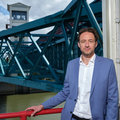Archive
23 January 2023
Paco Lopez Dekker: Bij NASA zijn ze jaloers op wat wij in Europa doen

In 2029 gaan twee Europese satellieten voor aardobservatie de ruimte in. Paco López-Dekker is hoofdonderzoeker van de missie. López-Dekker is aan de TU Delft hoofdonderzoeker van een satellietmissie die de Europese ruimtevaartorganisatie ESA afgelopen september selecteerde als de 10de Earth Explorer. Dat zijn missies met als doel te monitoren hoe processen op aarde veranderen door mensen. López-Dekker is de eerste Nederlandse hoofdonderzoeker van een Earth Explorer. Samen met zijn team bedacht hij de Harmony-missie en nu begeleidt hij de ontwikkeling ervan.
15 December 2022
NWO grant for research into sustainable accessible cities without private cars

With the growing density of housing in the city, good accessibility is a real challenge. A of low-car urban region without private cars offers space for more housing or nature, for example. But what are the best alternatives? And how do we make clean and smart mobility solutions, such as shared electric bicycles, accessible to everyone? To investigate this, the XCARCITY consortium, led by Bart van Arem (TU Delft) and Maaike Snelder (TNO and TU Delft), receives a NWO Perspectief grant.
14 December 2022
NWO Perspectief grant for flood protection research

Large areas of the Netherlands are at risk of being flooded. It was only last year, 2021, that rivers in the province of Limburg overflowed. A rise in sea levels and weather extremes, caused by climate change, calls for new technical and nature-based solutions for flood risk management and climate adaptation. The Future Flood Risk Management Technologies (Future FRM Tech) programme, led by TU Delft's Bas Jonkman, will receive an NWO Perspectief grant to work on flood-resilient and climate-adaptive coasts and rivers.
14 December 2022
ToDrinQ for better quality drinking water in Europe

Climate change and increased pollution from among others pesticides, pharmaceuticals and heavy metals, present drinking water operators with an increasing challenge to monitor and ensure the quality of our drinking water. Due to the increased risk and complexity of pollution, the EU has recently revised the drinking water directives and sharpened the risk assessment. As a result, drinking water operators face the challenge of collecting more information on drinking water quality in order to take timely action.
05 December 2022
Christian Tiberius in het IEEE Spectrum

Modern life now often depends on GPS (short for Global Positioning System), but it can err by several meters in cities. Now a new study from a team of Dutch researchers reveals a terrestrial positioning system based on existing telecommunications networks that can deliver geolocation info accurate to within 10 centimeters in metropolitan areas.